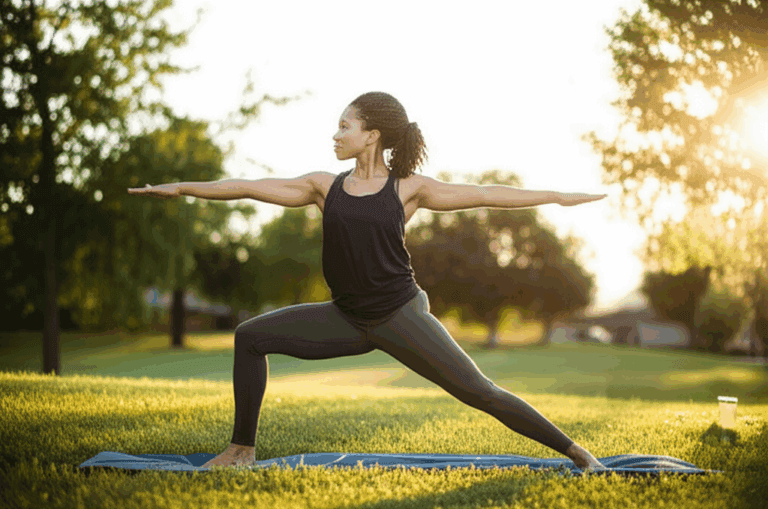In today’s fast-paced world, maintaining optimal physical and mental health is more important than ever. Fitness solutions offer a holistic approach to well-being, addressing both the body and the mind. Regular physical activity can significantly improve your mood, reduce stress, and enhance overall quality of life. Let’s explore the various ways fitness can be your ultimate solution for a healthier and happier you.
The Powerful Connection: Fitness and Mental Health
The link between physical fitness and mental well-being is well-established and supported by scientific research. Exercise isn’t just about building muscle or losing weight; it’s a potent tool for enhancing your mental and emotional state.
How Exercise Boosts Your Brain
- Releases Endorphins: Physical activity stimulates the production of endorphins, natural brain chemicals that act as painkillers and mood elevators. This can lead to that “runner’s high” and a general sense of well-being.
- Regulates Neurotransmitters: Exercise increases the levels of key neurotransmitters like serotonin, dopamine, and norepinephrine, which play vital roles in mood regulation, motivation, and focus.
- Reduces Stress Hormones: Physical activity helps lower the levels of stress hormones like cortisol and adrenaline, promoting relaxation and reducing anxiety.
- Promotes Neuroplasticity: Regular exercise stimulates the growth of new brain cells, particularly in the hippocampus, which is crucial for memory, learning, and mood regulation.
- Improves Blood Flow: Exercise enhances blood circulation to the brain, delivering more oxygen and nutrients, which can improve cognitive function and mental clarity.
Mental Health Benefits of Fitness
- Reduces Symptoms of Depression and Anxiety: Studies show that exercise can be as effective as antidepressant medication in treating mild to moderate depression and anxiety.
- Manages Stress: Physical activity helps relieve tension and stress, providing an outlet for frustrations and promoting relaxation.
- Improves Mood: Regular exercise can increase self-confidence, improve mood, and help you feel more relaxed and positive about yourself and your life.
- Enhances Sleep Quality: Exercise can help regulate your sleep patterns, making it easier to fall asleep and stay asleep, leading to improved mood and overall well-being.
- Boosts Self-Esteem: Achieving fitness goals and seeing improvements in your physical health can significantly boost your self-esteem and body image.
- Sharpens Memory and Thinking: Exercise improves concentration and mental sharpness, helping you stay focused on tasks and prevent age-related cognitive decline.
- Increases Energy Levels: Regular physical activity can combat fatigue and increase your energy levels, making you feel more alert and capable throughout the day.
- Builds Resilience: Exercise can help you develop resilience and cope with mental and emotional challenges in a healthy way, reducing the likelihood of resorting to negative coping mechanisms.
Fitness Solutions for Physical Well-being
Beyond the mental health benefits, incorporating fitness into your lifestyle is essential for maintaining optimal physical health.
Physical Health Advantages of Regular Exercise
- Weight Management: Exercise helps prevent excess weight gain, burns calories, and increases your metabolic rate, making it easier to manage your weight.
- Reduces Risk of Chronic Diseases: Regular physical activity can significantly lower your risk of developing chronic diseases such as heart disease, stroke, type 2 diabetes, and certain types of cancer.
- Strengthens Muscles and Bones: Exercise helps build and maintain strong muscles and bones, reducing the risk of injuries and disabilities as you age.
- Improves Cardiovascular Health: Exercise strengthens your heart and improves circulation, lowering your risk of high blood pressure, high cholesterol, and other cardiovascular problems.
- Increases Energy and Endurance: Regular physical activity improves your muscle strength and boosts your endurance, making it easier to tackle daily tasks and activities.
- Promotes Better Sleep: Exercise can help regulate your sleep cycle, leading to improved sleep quality and duration.
- Enhances Sexual Health: Exercise can improve sexual function, increase libido, and boost overall sexual satisfaction.
- Increases Lifespan: Regular exercise can help you live longer by reducing your risk of premature death from various health conditions.
Types of Fitness Activities for Mental and Physical Health
The best fitness solution is one that you enjoy and can incorporate into your daily routine. Here are some effective and enjoyable options:
Aerobic Exercises
Aerobic exercises, also known as cardio, are excellent for both physical and mental health. They increase your heart rate, improve blood circulation, and release endorphins.
- Walking: A simple yet effective exercise that can be easily incorporated into your daily routine. Aim for at least 30 minutes of brisk walking most days of the week.
- Running/Jogging: A more intense form of aerobic exercise that can significantly improve cardiovascular health and mood.
- Cycling: A great low-impact option that can be done outdoors or indoors on a stationary bike.
- Swimming: A full-body workout that is gentle on the joints and can be very relaxing.
- Dancing: A fun and social activity that can improve cardiovascular health, coordination, and mood.
- Hiking: A great way to enjoy nature while getting a good workout.
Strength Training
Strength training involves using weights or resistance to build muscle strength and endurance. It not only improves physical health but also boosts self-esteem and reduces stress.
- Weightlifting: Using free weights or weight machines to strengthen different muscle groups.
- Bodyweight Exercises: Exercises like squats, lunges, push-ups, and planks that use your body weight for resistance.
- Resistance Bands: A versatile and portable option for strength training that can be used at home or while traveling.
Mind-Body Exercises
Mind-body exercises combine physical movements with mental focus and breathing techniques, promoting relaxation and reducing stress.
- Yoga: A practice that involves a series of poses, stretches, and breathing exercises to improve flexibility, balance, and strength while promoting relaxation and stress reduction.
- Tai Chi: A low-impact exercise that involves slow, graceful movements and deep breathing techniques to improve balance, coordination, and mental well-being.
- Pilates: A method of exercise that focuses on strengthening the core muscles, improving posture, and promoting body awareness.
Other Activities
- Gardening: A relaxing and rewarding activity that involves physical movement and exposure to nature.
- Team Sports: Sports like basketball, soccer, and volleyball offer a combination of physical activity and social interaction, which can be beneficial for mental health.
- Martial Arts: Disciplines like karate and taekwondo provide a full-body workout while improving focus, discipline, and self-confidence.
Creating a Personalized Fitness Plan
To reap the full benefits of fitness, it’s important to create a personalized plan that suits your individual needs, preferences, and fitness level.
Tips for Getting Started
- Set Realistic Goals: Start with small, achievable goals and gradually increase the intensity and duration of your workouts.
- Choose Activities You Enjoy: The most effective fitness routine is one that you’ll stick with. Find activities that you genuinely enjoy and look forward to.
- Schedule Your Workouts: Treat your workouts like important appointments and schedule them into your calendar.
- Find a Workout Buddy: Exercising with a friend or family member can provide motivation, accountability, and social support.
- Incorporate Variety: Mix up your workouts to prevent boredom and challenge different muscle groups.
- Listen to Your Body: Pay attention to your body’s signals and rest when you need to. Avoid pushing yourself too hard, especially when you’re just starting out.
- Stay Hydrated: Drink plenty of water before, during, and after your workouts.
- Reward Yourself: Celebrate your progress and reward yourself for achieving your fitness goals.
Sample Weekly Fitness Plan
Here’s a sample weekly fitness plan that incorporates a variety of activities:
- Monday: 30-minute brisk walk or jog
- Tuesday: 45-minute strength training session (weights or bodyweight exercises)
- Wednesday: 30-minute yoga or Tai Chi session
- Thursday: Rest or active recovery (light stretching or foam rolling)
- Friday: 30-minute swimming or cycling session
- Saturday: Outdoor activity (hiking, gardening, team sport)
- Sunday: Rest or light activity (leisurely walk, stretching)
Overcoming Obstacles to Fitness
It’s common to encounter obstacles when trying to incorporate fitness into your life. Here are some strategies for overcoming these challenges:
- Time Constraints: Break up your workouts into smaller chunks of time. Even 10-15 minutes of exercise can be beneficial.
- Lack of Motivation: Find an exercise buddy, join a fitness class, or set small, achievable goals to stay motivated.
- Fatigue: Start with low-intensity activities and gradually increase the intensity as your energy levels improve.
- Financial Concerns: Take advantage of free or low-cost fitness options like walking, running, bodyweight exercises, and online workout videos.
- Physical Limitations: Consult with a healthcare professional or physical therapist to find exercises that are safe and appropriate for your condition.
Fitness Challenges for Motivation
Fitness challenges can be a fun and effective way to stay motivated and achieve your goals.
Popular Fitness Challenge Ideas
- Step Challenge: Aim for a certain number of steps each day, gradually increasing the goal over time.
- Squat Challenge: Gradually increase the number of squats you do each day for a set period.
- Plank Challenge: Hold a plank for a certain amount of time each day, gradually increasing the duration.
- Running Challenge: Set a goal to run a certain distance or number of times per week.
- Mindfulness Challenge: Incorporate daily mindfulness practices like meditation or deep breathing exercises.
- Healthy Eating Challenge: Focus on incorporating more fruits, vegetables, and whole foods into your diet.
The Role of Nutrition in Fitness
While exercise is crucial, nutrition plays an equally important role in achieving optimal physical and mental health.
Key Nutritional Guidelines
- Eat a Balanced Diet: Focus on whole, unprocessed foods, including fruits, vegetables, lean proteins, and whole grains.
- Stay Hydrated: Drink plenty of water throughout the day.
- Limit Processed Foods, Sugar, and Unhealthy Fats: These can negatively impact your energy levels, mood, and overall health.
- Time Your Meals: Eat a balanced meal or snack before and after your workouts to fuel your body and promote recovery.
- Consider Supplements: Consult with a healthcare professional or registered dietitian to determine if any supplements could benefit you.
Integrating Mindfulness into Your Fitness Routine
Combining fitness with mindfulness practices can enhance the mental health benefits of exercise.
Mindfulness Techniques
- Focus on Your Breath: Pay attention to your breath during exercise, using it as an anchor to stay present in the moment.
- Body Scan: Notice the sensations in your body as you move, paying attention to any tension or discomfort.
- Mindful Movement: Engage in activities like yoga or Tai Chi, which emphasize awareness of your body and breath.
- Gratitude Practice: Take a moment after your workout to appreciate your body and the ability to move.
Seeking Professional Guidance
If you’re new to fitness or have specific health concerns, it’s always a good idea to seek guidance from qualified professionals.
Types of Professionals to Consult
- Healthcare Provider: Talk to your doctor before starting a new exercise program, especially if you have any underlying health conditions.
- Certified Personal Trainer: A personal trainer can help you create a customized workout plan and provide guidance on proper form and technique.
- Registered Dietitian: A registered dietitian can help you develop a healthy eating plan that supports your fitness goals.
- Mental Health Professional: If you’re struggling with depression, anxiety, or other mental health issues, a therapist or counselor can provide support and guidance.
Fitness is Your Solution
Fitness solutions offer a comprehensive approach to improving both physical and mental health. By incorporating regular physical activity, mindful practices, and a healthy diet into your lifestyle, you can significantly enhance your well-being and quality of life. Whether you’re looking to boost your mood, reduce stress, manage weight, or prevent chronic diseases, fitness can be your ultimate solution for a healthier and happier you.







